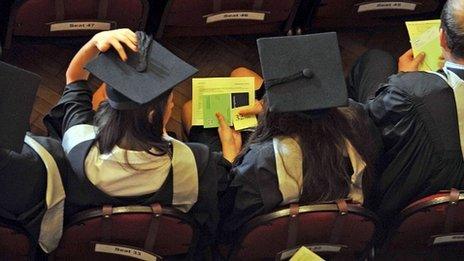University complaints 'rise by a quarter', says watchdog
- Published

Complaints have risen as university fees have increased
Complaints by students in England and Wales against universities rose by a quarter in 2012 to record levels, a report by an official watchdog says.
The Office of the Independent Adjudicator said it had received 2,012 complaints about institutions last year - up from 1,605 the previous year.
It said one in five complaints were upheld, partly upheld or settled.
Chief executive Rob Behrens linked the increase to students facing higher tuition fees.
The adjudicator's report for 2012 includes the first intake of students paying fees of up to £9,000 per year, with expectations that they will become more demanding consumers.
Compensation
The number of complaints received in 2012 was the highest since the watchdog was set up in 2004, the report said - resulting in compensation payments of almost £190,000 to students. Settlements do not necessarily involve compensation.
It reported instances of agreement, where universities agreed to re-mark work or to withdraw a fine imposed on a student for a disciplinary offence.
Students also received fee refunds, it said. On one postgraduate course, students were given back two-thirds of the annual fee when they complained facts about the course had been "misrepresented".
According to the report, business students were the most likely to complain.
The subject of complaints were not usually identified - but London South Bank University is named in the report for not complying with the adjudicator's recommendations.
The report gives anonymous examples of cases brought to the adjudicator.
A complaint was turned down from a student who said her anxiety disorder meant that she was upset by "negative comments". She argued that negative feedback from a tutor was "inappropriate and unprofessional".
An upheld complaint involved a student with severe depression who had been penalised for missing academic deadlines, despite the university having been notified of the student's problem and having received supporting medical evidence.
There were also complex procedural complaints, including problems where universities have partnerships with other institutions, and disputes over responsibility for overseas student visas.
The watchdog cannot address issues of academic judgement - such as how essays might be marked or admission to courses.
Instead, it examines issues such as the quality of university services, student welfare, discrimination and how universities follow their own disciplinary procedures.
Rising fees
Liam Burns, president of the National Union of Students, said: "No-one should be surprised that students are more demanding when they are forced to treat education as something they buy rather than as a process of study, debate and understanding."
Meanwhile, chief adjudicator Mr Behrens said he expected more complaints as more students were paying higher fees.
"We haven't seen the full impact of the fee increase yet, because most complaints are from third-year students and the fees do not apply to them yet.
"The government is encouraging students to behave like consumers and I think that has had an impact."
Eric Thomas, president of Universities UK, said that the rise in complaints reflected growing awareness of the complaints process.
He said that a few hundred upheld complaints needed to be put into the context of a student population of more than two million.
"The increase in fees means that students are clearly demanding more from their universities. The important thing is ensuring that students have enough information about their courses and that the experience matches their expectations," he said.
A spokeswoman for the Department for Business, Innovation and Skills said: "Our reforms are designed to provide a better-quality experience for students, by ensuring universities are more accountable and responsive to their needs.
"This includes responding promptly and effectively to problems and complaints."
- Published14 June 2011
- Published14 June 2012
- Published15 June 2010